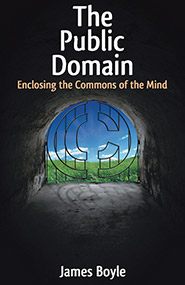Is There Such a Thing As "Intellectual Property"?
 We believe that the idea of “intellectual property” is not found in the Bible or in natural law. Some of the greatest Christian thinkers of our time have challenged the idea of “intellectual property” here and here (also read a secular perspective here). As Owens writes in his book The Dorean Principle:
We believe that the idea of “intellectual property” is not found in the Bible or in natural law. Some of the greatest Christian thinkers of our time have challenged the idea of “intellectual property” here and here (also read a secular perspective here). As Owens writes in his book The Dorean Principle:
A biblical view of natural law delegitimizes the entire notion of intellectual property…. the relatively recent advent of copyright regulations demonstrates their nature as purely human inventions. If they were instead codifications of a divine principle, one would expect such statutes to appear earlier in human history. Additionally, while most relevant laws protect material property to perpetuity, the copyright protection offered by governments is—in all but a few circumstances—temporary. This constitutes an implicit concession that “intellectual property” is not property in the truest sense. The fact that some of these protections last for twenty years and some longer than a lifetime testify to the arbitrary nature of intellectual property law. With material property, a violation of the eighth commandment (thou shalt not steal) results in direct loss for another individual. With intellectual property, undesired copying and use of a published work may only be counted as a loss when estimating the potential of an idea to garner profit. In the words of Thomas Jefferson:
If nature has made any one thing less susceptible than all others of exclusive property, it is the action of the thinking power called an idea, which an individual may exclusively possess as long as he keeps it to himself; but the moment it is divulged, it forces itself into the possession of every one, and the receiver cannot dispossess himself of it. Its peculiar character, too, is that no one possesses the less, because every other possesses the whole of it. He who receives an idea from me, receives instruction himself without lessening mine; as he who lights his taper at mine, receives light without darkening me. That ideas should freely spread from one to another over the globe, for the moral and mutual instruction of man, and improvement of his condition, seems to have been peculiarly and benevolently designed by nature, when she made them, like fire, expansible over all space, without lessening their density in any point, and like the air in which we breathe, move and have our physical being, incapable of confinement or exclusive appropriation.
Just as Christians are called to resist any government who would contradict God’s word and redefine something like marriage, we suggest that we must resist the unbiblical category of “intellectual property” and the notion and practice of “copyrighting” in the context of gospel ministry. This may come at a cost, but the joy and eternal reward will be worth it.
In summary, this is what we know:
- Copyright law did not exist for all of human history until 1710.
- The idea of intellectual property or copyright law is nowhere to be found in the Bible.
- Scripture itself was never copyrighted by its authors or Author. If this had been important to God, he would have revealed its importance and providentially guided human governments to enact copyright laws long before Scripture began to circulate.
- To our knowledge, no one has ever written a full, robust biblical defense of intellectual property and copyright law. Until that happens, it must be assumed that no biblical defense exists. Christians throughout history have written thousands of defenses of just about all minutiae you can imagine, but never about this, which makes it suspect. We sincerely would love to see someone undertake this task if they are serious about showing that copyright is a biblical principle.
- Copyright hinders rather than helps the growth of the Church, the spread of the gospel, and Bible translation (see The Christian Commons for examples of this).
- If you want an idea to remain solely in your possession, God has already provided a perfect way to do that: never tell anyone about it. Keep it a secret.
- To be clear, we’re not totally against the idea of intellectual property in the context of for-profit business that isn’t related to Scripture and the gospel. But we want to point out that IP should not be taken for granted in the context of Christian ministry, and if someone claims IP rights in that context, they should have clear, compelling biblical reasons and precedent for doing so.
